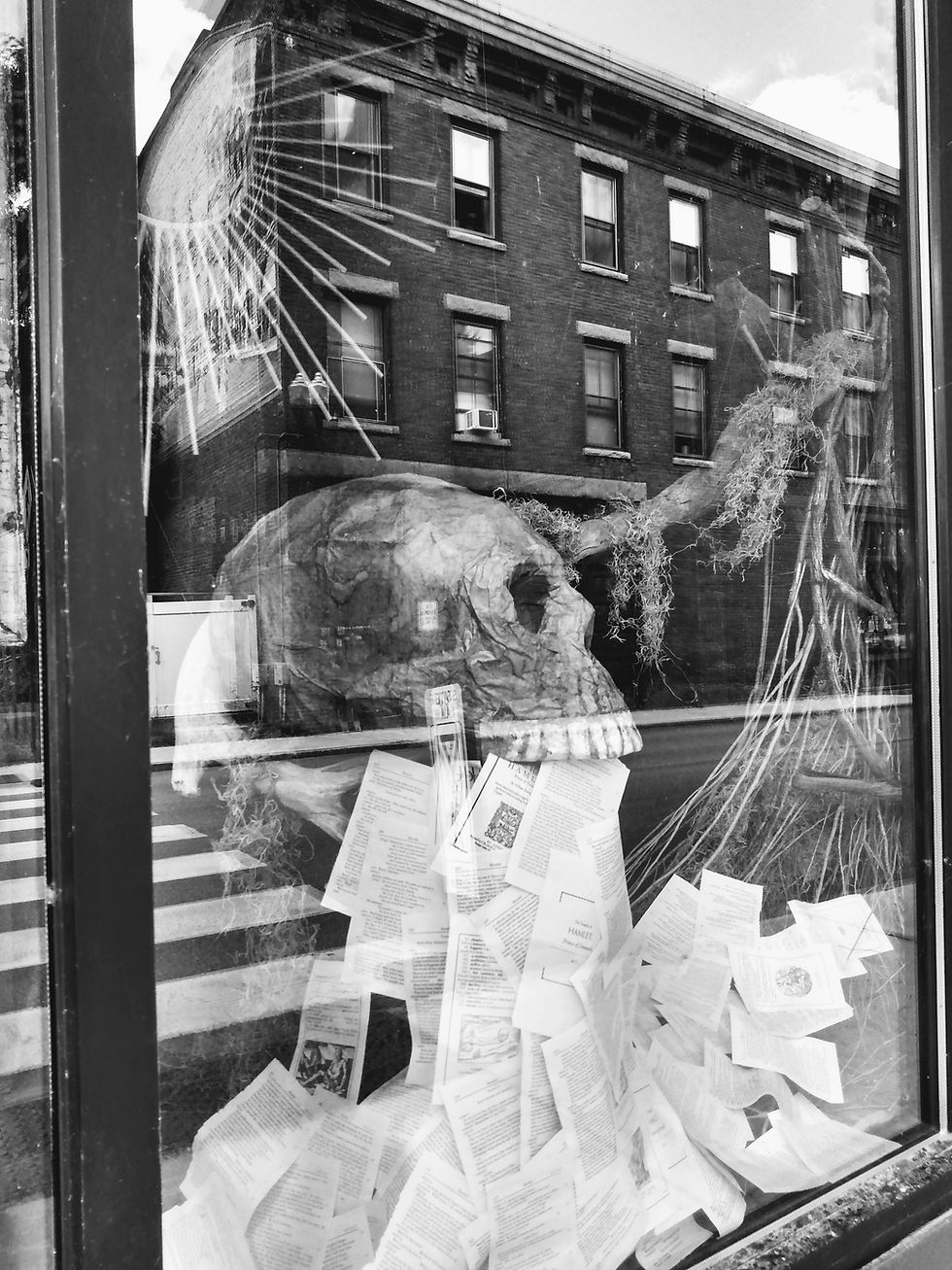Carlo Rey Lacsamana
- ZiN Daily
- 20. pro 2023.
- 9 min čitanja

Image: Unsplash, downloaded (https://unsplash.com/photos/dSw-bJ_-2K8) 15.10.2023.
If only we knew (On Anton Chekhov)
For some reason I’ve always carried the conviction that it is to literature I owe my enormous capacity for disappointment. Or, to be precise it was Chekhov who cultivated this capacity in me. By reading and rereading him I am constantly reminded that whatever life throws at me will always in the end be bearable.
Maybe because no other writer in my view has looked at life with such lucidity and sincerity as to strip the reader of his illusions and hopes. He takes human life into writing largely as it is without sentimentality or any political or social agenda. To read Chekhov is to acknowledge the inescapable possibility that our lives could go wrong whether by our own fault or the fault of circumstances which cannot be avoided. That’s where the depth and the pathos of his writings come from: in his ability to allow life to defeat his art; to allow life to lead art by the hand rather than the other way round.
You read Chekhov and you gradually acquire a more tolerant, albeit wisely cynical, tender view of life because he chooses for his themes the commonplace events, the unexceptionally redundant, sometimes dull, often heartbreaking, often pathetic, ordinariness of life which many of us live through.
Because literary for Chekhov simply means living. His style lies in the way he values the aesthetic as much as the actual, ordinary life. His aesthetic begins with disappointment as the coherent, inherent condition of modern life. His style is simple but not slight, straightforward but subtle that the seeming banality of his themes is strengthened by interruptions of sudden longings and dangerous abandon full of generous wisdom.
In his best plays we are confronted by that Chekhovian sensibility of wise disappointment, comic heartbrokenness, and a particular Chekhovian sadness. He’s the only writer I could think of who gave sadness its unforgettable aesthetic charm and humor. A sadness that is not indulgent; often it comes out of the failure of the human will and social aloneness. Nowhere in the history of Russian literature is sadness fully and articulately expressed than in his major plays. It is in these plays that we discover that sadness is the substance, the inference of both tragedy and comedy. In other words, life is fated to be sad but nonetheless endurable that one is more than allowed to laugh or cry about it.
His works don’t possess the intensity and prolonged tension of Tolstoy’s (whom he admired), nor do they indulge in the macabre psychological moralizing of Dostoevsky’s, nor do they embark in political partisanship as those of Gorky’s. He refuses any dogma or doctrine to dictate his literary style; rather an overwhelming openness and tolerance guide his writing that some critics accuse him of “unremarkable lines” for their banality. I completely disagree. Take the opening lines of The Seagull:
MEDVEDENKO: Why do you always wear black?
MASHA: I am in mourning for my life. I’m unhappy.
Aren’t these lines comic enough in their straightforward simplicity and tragic enough for their clairvoyant bleak mood? To notice someone’s clothing style and discover the message it carries is a striking and truly original opening for a play.
His characters are grounded in actual life that they are too often familiar as though we the readers watch/read ourselves through them. Chekhov allows them to speak their unassumingly everyday language—which is the true language without chastising the readers with the excesses of 19th century moral diatribe. The absence of high-flown language in the conversations touches our sense of everyday reality. They are so embedded in the language of actual life that we ourselves speak them in our own way, in our own voice because we relate to Chekhov’s concerns: unhappy marriage, boredom, the failings of love, unvoiced affection, frustration, loneliness, mediocrity, an unlived life, disappointed hopes…such themes from a writer whom biographers consider a merry, light-hearted, life-loving man. Perhaps only a man of such cheery disposition can write with honesty and without sentimentality the nature of modern melancholy.
Chekhov was fascinated by unrequited love—a love that cannot be returned. Most of his plays are plagued by characters whose love is either painfully mute or scandalously ignored. As in The Seagull: Masha’s love for Treplyov, Treplyov’s for Nina, Polina’s for Dorn; in Uncle Vanya: Sonya’s for Astrov, Voynitsky’s for Yelena; in Ivanov: Sasha’s for Ivanov. Yet despite the expected failures of love they continue to love even up to the point of unhappiness like Saha’s love for Ivanov who suffers from guilt and helplessness or Treplyov’s love for Nina which ends in self-destruction. It sometimes occurs to me that love for Checkhov is a one-sided traffic of acts of selfless love; that to love doesn’t necessarily lead to being loved back; that love’s constant companion is disappointment. Medvedenko to Masha in The Seagull:
“But your soul and mine have no points of contact. I love you. I can’t stay at home because of my longing for you…but I get nothing from you except indifference.”
Nevertheless, he insists in the effort of loving; one senses altogether that the effort itself is the meaning of love as voiced by Sasha in Ivanov: “The greater the effort, the greater the love.”
Ennui, which accompanies unrequited love, is one of the main human ordeals in a Chekhovian landscape. Ennui implies an inevitable descent to dissipation or vodka and sheer inaction and cynicism; it consists of pointless small talks, gratuitous drinking and playing cards, vulgar flirtations, ostentation, gossiping, brooding. Ennui for Chekhov is the opposite of the love of life—that is the tiredness of life as embodied by characters like Treplyov, in certain instances by Masha in the Three Sisters, by Astrov and Voynitsky in Unce Vanya and most articulately by Ivanov who resembles Hamlet in his personal invective:
“And now how cruelly life, the life which I fought against, is avenging itself on me. I’ve worn myself out. At thirty-five I feel like a man after a drunken bout; I’m old already, I’ve put on an old man’s dressing-gown. I go about with a heavy head, with a lazy soul, tired and broken, without faith, without love, without aim; I wander about among my friends like a shadow, and I don’t know who I am, or why I live, or what I want. Already it seems to me that love is silly, that caresses and endearments are sugary nonsense, that there isn’t any meaning in work, that song and impassioned words are trivial and old-fashioned. And wherever I go I bring misery, blank boredom, discontent, disgust with life... I’m ruined, helplessly ruined! Before you stands a man tired at thirty-five, disenchanted, crushed by his trivial efforts – burning with shame and jeering at his own weakness.”
This Chekhovian ennui is a literary and existential twin to Leopardi’s concept of noia: the state of indifference and insensibility; the incapacity to be possessed with enthusiasm and passion. Although there are characters in Chekhov’s works whose ennui gravitates towards despair like Ivanov and Treplyov whose suicide becomes the inevitable articulation of tragedy, Chekhov believes unswervingly in the possible redemption of life through work. Ennui is simply the lack of worthwhile thing to do.
Work for Chekhov is a cure for despair; though it may not provide a profound practical or spiritual amelioration, work allows us to proceed in life. To be busy, to occupy one’s hands and head on something is to brush off the grip of depression and ennui. In the Three Sisters Irina insists: “We must work, work! The reason we feel depressed and take such a gloomy view of life is that we’ve never known what it is to make a real effort.” Sonya and Voynitsky in Uncle Vanya respond to all that is hopeless in their life through work:
SONYA: “Well, what can we do? We must go on living! We shall go on living Uncle Vanya. We shall live through a long, long succession of days and tedious evenings. We shall patiently suffer the trial which fate imposes on us; we shall work for others, now and in our old age, and we shall have no rest.”
Like Tolstoy he religiously believes in “the dignity of labor.” It is work that shapes the character of man; it is the main spring of virtue. “An idle life can’t be virtuous,” Chekhov said. Work in its most fundamental and practical sense: the act of becoming busy; nothing idealistic or metaphorical; not in the Marxist conception of the word which constitutes the socialistic idea of workers control over production; nor in the theological conception of work that allows human nature its free play. It is work—not optimism, not happiness, not even hope—that makes redemption in man possible. No other writer, perhaps more than Tolstoy, has ascribed the potency of work as an instrument of endurance. He emphasizes its need and necessity precisely in the moment of defeat and failure. When Irina in the Three Sisters hears of the news of her fiancé killed in the duel she declares:
“Someday people will know why such things happen, and what the purpose of all this suffering is... Then there won’t be any more riddles... Meanwhile we must go on living... and working. Yes, we must go on working!”
Laziness, on the other hand, is the ultimate sin for Chekhov: “I despise laziness just as I despise weakness and sluggishness of emotions.” In all aspects of his life, he was never lazy; there was always something to do, to work for, to be busy about. There was scarcely a humanitarian domain which Chekhov has not dedicated his life. He was a doctor of life as much as he was a universal writer. A true citizen his humanitarian acts encompassed all aspects of Russian life. Chekhov expert Simon Karlinsky wrote:
“His life was one continuous round of alleviating famine, fighting epidemics, building schools and public roads, endowing libraries, helping organize marine biology libraries, giving thousands of needy peasants free medical treatment, planting gardens, helping fledgling writers get published, raising funds for worthwhile causes, and hundreds of other pursuits designed to help his fellow man and improve the general quality of life around him.”
Despite the bouts of ill-health (he died of tuberculosis at age 44) his prolific literary output set a demanding and daunting standards for a writer. One can pick endless maxims from his letters on the necessity of constant work. “Write till your fingers ache,” he once wrote. For Chekhov writing is labor and must constitute the backbreaking consistency and the consequences of tiredness and weariness of a manual work. “What one needs is constant work, day and night, incessant reading, study and exercise of will. Every hour is precious.” Writing as the supreme practice of self-discipline.
Our sympathy is thoroughly engaged when Chekhov deals with the misery of the unlived life. It is noticeable that his heart goes to those characters whose lives failed to work out the way they wanted them to work out. A sympathy that goes beyond the bias of a certain class. It is in this sense that he is a non-political writer. His partisanship is not bound by a particular class or ideology but is made up of a vast and active sympathy for those who are defeated by life. He perceives his characters with diligent understanding, recognizing that the ambiguities and responsibilities of life are bigger than their dreams and hopes. In an alienating, isolating world is not understanding—a quiet, partial, brotherly understanding what we truly long for from others rather than pity or comfort?
For disappointments do not necessarily nourish us or make us wiser, more often they wound us to the point of permanent brokenness. It is to suffer the Chekhovian sadness embodied in the words “If only we knew” uttered by Irina in the final scene of Three Sisters when the three sisters discovered the impossibility of returning to Moscow. Nothing to do with indulgence or self-pity, rather with the inexhaustible condition of heartbrokenness, of being touched by devastation, of reassurances breaking down, of promises unfolding into disappointments. If only we knew is an acknowledgement of moments when we are not in control of our lives, when self-determination turns into folly; it is a heart-wrenching articulation of grief.
With the recognition of grief, Chekhov insists in carrying on. Are not Chekhov stories a repertoire of endurance? The need to carry on graces his works. One can interpret his best plays as a radical plea for endurance. The capacity to endure for Chekhov is the touchstone of human dignity. In Christian terms one must bear one’s cross.
The tragicomic beauty of endurance in the Chekhovian sense brims with urgency; it is declared in painful exuberance, in a voice that has recognized defeat to be bigger than life; no answers or solutions are given. Listen to the poignant confession of the failed actress Nina in The Seagull:
“I think I know now, Kostya, that what matters in our work—whether you act on the stage or write stories—what really matters is not fame, or glamour, not the things I used to dream about—but knowing how to endure things. How to bear one’s cross and have faith.”
Because life’s instructive, maddening, and endearing complexity is worth enduring. It is this inextricable intimacy between the worthiness of life and endurance that constitutes Chekhov’s love of life. To endure is to manifest one’s dangerous love of life. Dangerous because one no longer traffics on hope or soft promises or false optimism; nor investing in self-mastery or self-determination; but to allow life to touch us, to lead us, most importantly to defeat us as the great poet Rilke affirms that such is the purpose of life: “by being defeated, decisively, by constantly greater things.”
About the Author: Carlo Rey Lacsamana is a Filipino writer, poet, and artist born and raised in Manila, Philippines. Since 2005, he has been living and working in the Tuscan town of Lucca, Italy. He regularly contributes to journals in the Philippines, writing politics, culture, and art. His works have appeared in Esquire Magazine, The Citron Review, Drunkmonkeysweb, Amsterdam Quarterly, Lumpen Journal (London), The Wild World (Berlin), Literary Shanghai and in other numerous magazines. His short story Toulouse has been recorded as a podcast story in the narrative podcast Pillow Talking (Australia). Follow him on Instagram@carlo_rey_lacsamana








Komentari